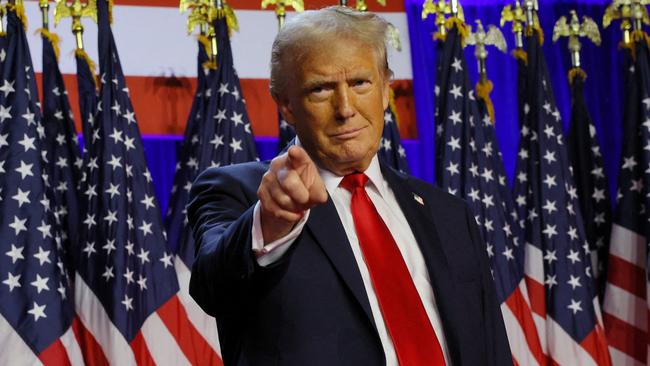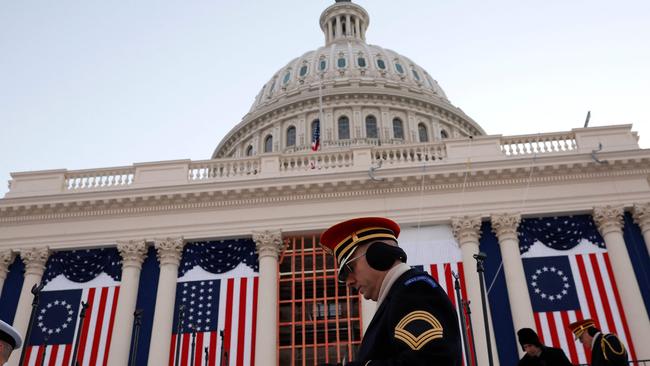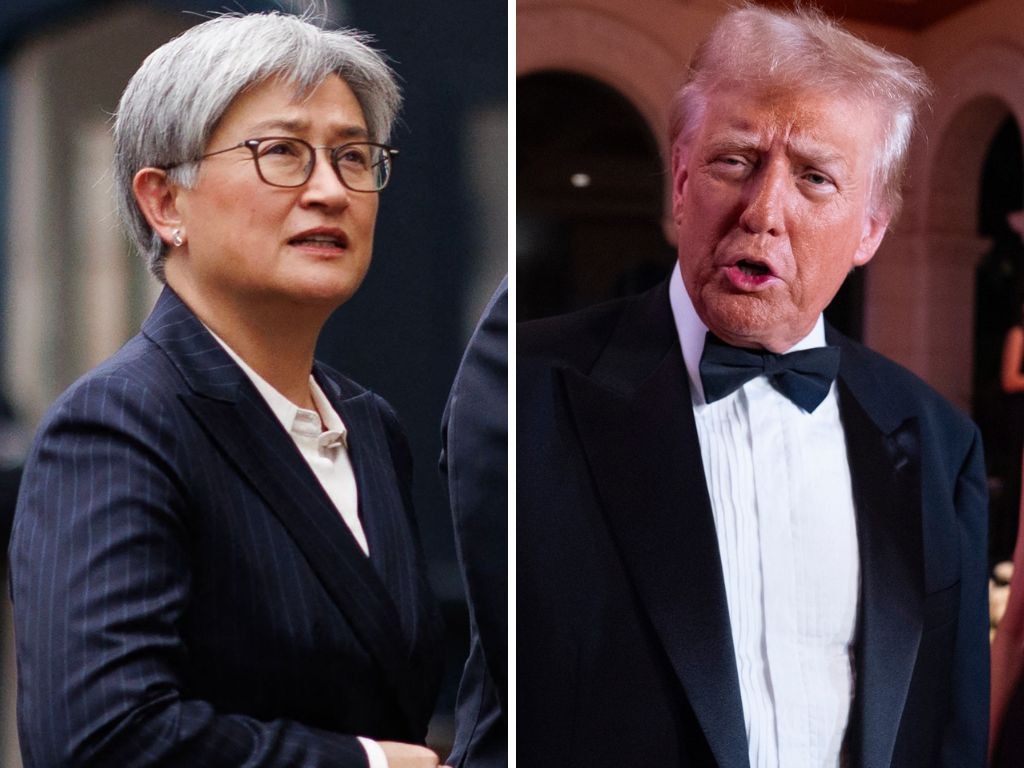‘Let Trump be Trump’: Opponents play waiting game on bold agenda

But opponents and doubters of the president-elect – on either side of the political spectrum – may also issue the same call for their own purposes.
Among the many paradoxes to describe the current American political condition, one stands out as particularly counterintuitive: that Donald Trump at the wheel might just be of service to friends and foes alike.
The latter might choose to believe this time around that Trump, intoxicated with near unbridled power, bullish and brimming with self-righteous justification, will invariably crash and burn on his own accord. A drunk driver at the wheel only has one fate, they suppose.
Although sore at having Trump’s standard once again fly above the Oval Office, the defeated
Democratic Party may actually seek solace by seeing it as a means to eventually diminish their main opponent and everything he stands for.
In part, Trump’s victory is a testament to the resiliency of American conservatism in its broadest form. Even so, the American political left seem mostly focused on the carrier rather than the cause.
Since Trump dashed their hopes at November’s US general election, Democrats have been
plotting ways to reconstitute their opposition to an adversary who is increasingly lionised by his tribe, imbued with abundant luck – that most valuable of political virtues – and who is more fearless than at any time during his public life.
Trump today is different and the same. He is now better understood by his opponents after his first term.
Opponents also know that Trump remains predisposed to a soaring optimism of what he alone can achieve while continuing to be disinterested in nuance. This means he remains especially prone to ignoring the possible downsides of his rhetoric, decisions and policies.
On the back of his remarkable political comeback, and now more than ever, Trump wants to be seen as “the man at the end of the long table” – a president of stature with a wide warrant in America and beyond, recently expressed by his sabre rattling at Mexico and expansionist enthusiasm towards Canada, Greenland and Panama.
Waging heavily on Trump’s unsighted downsides and zero-sum hyperbolic positions, Democrats could see value in suffering Trump’s raw indulgences as an opposition strategy.
Where orthodox methods of rebuttal, revelation and reaction have repeatedly failed to even blunt Trump’s political authority, frustrated Democrats may look to more unorthodox ways to realise the same goal. Though they won’t roll over for Trump or his people, they may scheme to hold their noses at times and simply let Trump be Trump.

Democrats may think that Trump unleashed – his ambition so naked and expansive – will be wide open to two scenarios that could cause him political harm.
The first is failing to deliver on his promise to fix America during the span of his final four years in power. Though he will serve again as a non-traditional president, Trump will largely be judged by traditional metrics – principally his ability to deliver on his plans and govern soundly. Based on the uproarious nature of his first term neither can be objectively considered as great strengths of Trump’s.
The second scenario is overextension. This is particularly treacherous ground for Trump as he is guilty of inflating the scale of his win and its meaning.
The final tallies of the 2024 presidential race indicate that Trump’s own election night narrative of securing an “unprecedented and powerful” electoral mandate to wholly validate his agenda and vindicate his licence to govern as he sees fit is, in fact, highly contestable.
In sweeping the swing states, Trump also won the popular vote with 49.9 per cent nationally. But measured against those presidents who enjoyed mandates easily judged to be overwhelming after landslide election wins – including Ronald Reagan in 1980 and 1984, Richard Nixon in 1972, Lyndon Johnson in 1964 and Franklin Delano Roosevelt in 1936 – Trump’s popular vote in 2024 fell well short.
Furthermore, it was lower than Joe Biden’s at the 2020 election, Barack Obama’s in 2008 and 2012, and George W. Bush’s in 2004.
The president-elect may have another a reason to locate the brakes: though bested by Trump,
outgoing Democratic vice president Kamala Harris’s own popular vote tally was higher than Trump’s 2016 win and Bush’s in 2000.
In order to sustain his political mandate, and by extension confidence in his political brand, Trump will need to exercise uncommon restraint in not moving too far beyond where the wider electorate is comfortable.
How Trump is seen to prosecute his first 100 days and how his decisions translate into reality will provide early tests to the substance of his mandate.

All new administrations face some backlash early on as sudden change can be unsettling.
Given the seismic scale of Trump’s immediate agenda – which includes ordering mass deportations of undocumented immigrants, acting against perceived political enemies, ripping asunder governing norms and practices, critically reviewing America’s military assistance to Ukraine, and sanitising the divisive January 6 attack on Capitol Hill – it is entirely possible that he could soon face an electorate more restive than restful, as Democrats would hope.
Democrats may also find hope in that some of Trump’s own party may be stirred by similar thoughts on Trump, and how to tip political balance in the Republican Party away from him and his America First philosophy.
There are some Republican Senate lawmakers – most noticeable in the ‘establishment’ wing of the party – who have resisted full fealty towards Trump’s populist dogma and are troubled by his political style. While acknowledging the so-called ‘Grand Old Party’ is now the party of MAGA, they have taken up some positions to curb Trump’s influence and aspirations in the powerful upper chamber.
One such move was elevating John Thune of South Dakota, a traditional conservative in cut and form, as the new leader of the Republican-controlled US Senate while kneecapping the America First aspirant for the post, Senator Rick Scott of Florida. From his new perch as majority leader, Thune has already cast doubt on the reality of fully executing Trump’s mass deportation idea.
Another GOP senate check on Trump was their clear rejection of his first nominee for attorney
general, Matt Gaetz, with party unanimity around confirming other controversial cabinet nominees not a given.
Indeed, citing due process GOP senators have checked Trump’s demand to have the senate quickly confirm all his office nominees and swiftly pass his prized omnibus bill, which will consolidate the president-elect’s ambitions on tax cuts, border security and other big ticket policy items.
Even in the House of Representatives, where GOP members tend to promote a more potent form of Trumpism than the Senate, has in recent times baulked at a wholesale granting of Trump’s wishes.
Witness the move by some GOP members to ignore the president-elect’s orders to ease fiscal
discipline by suspending limits on the national debt for two years to support his tax relief plans and the reluctancy showed by some Republicans to fall in behind Trump in support of Mike Johnson’s re-election as Speaker of the House.
When Trump takes the oath of office on January 20, he will bear a Republican-controlled upper and lower house.
Their respective majorities are pretty narrow, however, and with new evidence suggesting his power over the legislative arm of party is not complete, Trump will not be able to afford too much dissent or discord among his own parliamentarians.
Even so, for any Republican who yearns to relax or release Trump’s bonds, letting him run free might just been viewed as the best circuit breaker they needed to reset power within their party. It seems abnormal to consider self-sabotage as a tactic, but some weary Republicans may suggest these are not normal times.
Trump for some critics is allegorical of a recidivist drunk driver who somehow evades sanction: a man whose acute senses are dulled and his judgment impaired, yet entirely soaked in self-belief and utterly reckless at the controls.
Just as the drunk driver can’t forever escape wrecking the car and losing their licence – thus getting them off the road for good (notwithstanding the collateral damage) his opponents believe that letting Trump be Trump could be the only strategy that works this time around.
Craig Greaves is a writer and former adviser to the US Embassy in Wellington





On the eve of his return to power, the battle cry of “Let Trump be Trump” will echo among allied ranks enjoying what might be considered the halcyon days of the America First movement.